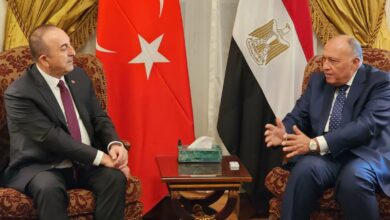TRIPOLI — The moderate National Forces Alliance of wartime prime minister Mahmoud Jibril scored a landslide victory over rival Islamist parties in Libya's first free national election in a generation, partial tallies showed on Thursday.
Counts from across the North African country attested to a resounding defeat for the political wing of Libya's Muslim Brotherhood, bucking a trend of success for Islamist groups in other Arab Spring countries such as Egypt and Tunisia.
Final official results are not due until next week. But with a large majority of votes counted, Jibril's alliance had unbeatable leads in Tripoli, the desert south, and the eastern city of Benghazi, the cradle of last year's rebellion against 42 years of Muammar Qadhafi's rule.
"The people saw in Jibril an openness to the rest of the world and they craved this openness after being closed off by Gaddafi," Libyan political analyst Nasser Ahdash said of the Western-educated politician who became the face of last year's uprising.
Another Islamist group, the Al-Watan ("Homeland") Party of former Islamist militant Abdul Hakim Belhadj, failed to take off. Belhadj was even set to lose in his Tripoli constituency.
"We've got to reevaluate our performance and decide what kind of alliances we would like to make or to be a strong opposition by ourselves," party spokesman Anas al-Fetory said.
No immediate comment was available from the NFA or Justice and Construction, the political arm of the Muslim Brotherhood.
In Central Tripoli district, Jibril's alliance won 46,000 votes against 4,000 for Justice and Construction. He scored victories in three other Tripoli districts and an allied party won the fifth.
"I voted for him," oil worker Ayman Abuda, 35, said as he shopped for groceries in Tripoli. "I hope Libya now will have a good future. The results show that my choice was right."
Rivals now have the chance to appeal the vote before the result is declared final. Moreover, Jibril's nationwide wins will not automatically translate to a majority of the new 200-head assembly since the bulk of its seats have been allotted to independent candidates whose allegiances are hard to pin down.
That assembly is due to pick a prime minister and cabinet before preparing for full parliamentary elections next year. Speculation is growing that Jibril could emerge from the process as Libya's next leader — potentially as president if a new constitution chooses that form of government.
Jibril is playing down talk of his future role for now and has called for parties of all hues to come together for talks on forming a national unity coalition with a priority of rebuilding Libya.
Yet such contacts could be prickly, with Islamist groups this week accusing Jibril of playing up his Islamic credentials to woo religious-minded voters.
Jibril, 60, says he has been a devout Muslim since the age of 14 and has long rejected the labels of secular and liberal.
"There are no liberals in Libya," said Suleiman Zoobi, an independent candidate winner in Benghazi. "Jibril is a Libyan who fasts and prays and whoever says he is a liberal doesn't know what they are talking about."
Aside from his high profile in last year's uprising, analysts said Jibril was seen as a safe pair of hands to rebuild the oil-based economy, which the International Monetary Fund predicted this week would quickly bounce back.
Many Justice and Construction candidates, on the other hand, were unknown to Libyan voters, some of whom are put off by what they perceive as links between it and Egypt's Muslim Brotherhood — an affiliation the party denies.




